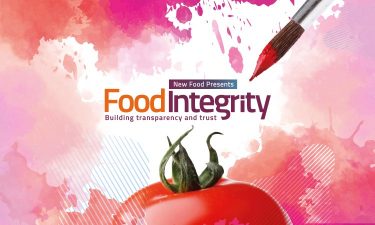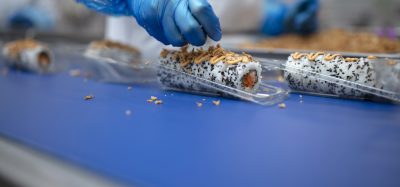Less talk, more action: discussing food integrity
- Like
- Digg
- Del
- Tumblr
- VKontakte
- Buffer
- Love This
- Odnoklassniki
- Meneame
- Blogger
- Amazon
- Yahoo Mail
- Gmail
- AOL
- Newsvine
- HackerNews
- Evernote
- MySpace
- Mail.ru
- Viadeo
- Line
- Comments
- Yummly
- SMS
- Viber
- Telegram
- Subscribe
- Skype
- Facebook Messenger
- Kakao
- LiveJournal
- Yammer
- Edgar
- Fintel
- Mix
- Instapaper
- Copy Link
Posted: 28 February 2020 | Bethan Grylls (New Food) | No comments yet
With just a few weeks until Food Integrity kicks off, New Food’s Editor met with Andy Richardson, one of the conference Chairs, to discuss his thoughts on the subject of food integrity and how it represents change for good.


Andy Richardson, Head of Corporate Affairs, Volac and Chair of the Welsh Food and Drink Board will be chairing the forthcoming Food Integrity event on day two and moderating several of the panel sessions throughout the course of the day.
Defining food integrity
You may have noticed that the question ‘what is food integrity?’ has featured in several of our Food Integrity 2020 articles as it’s a subject that I’ve personally become fascinated with due its many facets. The further we have progressed with planning the conference, the more I have come to appreciate the full scope of what is encompassed by ‘integrity’.
I asked Richardson what it meant to him. “For me,” he said, “it is about quality in the wider sense; so in order to define it that’s what we need to look at. In my opinion, the wider issue of quality incorporates several things: it is nutrient quality, microbiological quality, as well as authentication or provenance – being able to deliver on our promises. And it is about doing the right thing, so there’s an environmental side to food integrity too. Quality is important because it enables us to add value both in the UK and on the international stage.”
As an industry that fuels and nourishes the human race, integrity is essential. What is more important than delivering not only safe products, but products that are honest, good for the planet and ethical? It is not simply a case of ticking boxes; it is about going above and beyond for the sake of the consumer, for the sake of the planet and for the sake of the industry. I ask you this: if you aren’t considering integrity in 2020, if you aren’t delivering products with this in mind, what do you think will happen to your products in the future? Will they have a long term market?
The wider issue of quality incorporates several things: it is nutrient quality, microbiological quality, as well as authentication or provenance.
I really believe Food Integrity 2020 to be of incredible value. It is a chance to hear from a choice selection of industry professionals and leaders about the challenges faced and solutions proffered; to hear first-hand, the lessons experts have learnt and how we can work together to build a better future. The full list of speakers is available here.
“What I am really looking forward to,” Richardson revealed, “is having a highly in-depth and balanced discussion, and coming out with several key points that we can develop and work together as an industry to deliver. It would be great if we could establish just three key areas that we can actually work on – and really deliver.
“It is very easy to go to conferences and just talk about the issues and not come up with any answers. We need to keep it simple and act on just a few of the key points, rather than focusing on superficial issues.”
I agree with Richardson – this conference is not just about talk, it is about action; about taking the issues identified over these two days and doing something about them.
Food and drink regulation
Richardson will be moderating several panels on day two of Food Integrity, one of which will focus on how best to regulate to increase integrity. Ahead of this session, I asked for his thoughts on this.
“When we talk about regulation in business it can be interpreted as a chain around your neck,” he said, “but it also allows for opportunity. Of course, it is about ensuring people do what they say they’re going to do and that their products meet legal standards, but if we get it right, it could potentially lead to added value and to new markets.
“In terms of whether industry is doing enough to ensure all the different aspects that food integrity encompasses, I think the honest answer is we don’t know. It is a very difficult question to answer.”
He explained that there are a lot of people in business who will just follow the regulations without question, but emphasised the need for discussion.
“We must establish what we need and figure out the best practice. We need to be willing to chop away at the things that don’t add value,” he noted. “I would like to have a conversation with industry, focusing on what customers need in the home and export markets.”
Richardson also said that he would like to see consumers having more influence over regulation. “Industry is not questioning whether the regulation we currently have is what we need. The sweet spot lies in co-creation; where academia, industry, government and consumers work together. That is what is missing.”
Of course, the drive for food integrity is not unique to the UK, and although New Food might be based in Britain, we are a truly global publication. Food is obviously ubiquitous; grown, produced, exported, imported, purchased and consumed in every region of the blue planet. New Food explores the issues and the solutions that exist around the world; the research and the innovation that experts from all over are devising. As such, our conference is also global, with professionals from numerous nations coming together to discuss and debate. One of the key issues regarding food regulations, is creating a harmonised approach.
In terms of whether industry is doing enough to ensure all the different aspects that food integrity encompasses, I think the honest answer is we don’t know.
“It is difficult,” Richardson admitted. “We need to talk the same language. If you have regulation A in Europe, then you need to know how that it directly relates to regulations in other countries. We need a matrix of commonality where things cross over. This will be so important in a post Brexit world where the language of Government is ‘equivalence’.”
He added: “There is a danger with Brexit that we’ll strip back on the regulation because people will want to simplify processes and we’ll end up restricting our access to EU markets.
Sustainability
In terms of sustainability, Richardson said we must ensure we are looking at the whole picture. “People will only believe what they want to believe and there is much information which doesn’t consider the big picture,” he contended. “Very few are willing to see the common ground, assess the unintended consequences. An example of this is with the rise of Veganism and alternative meats. Will traditional meat have a future? I believe they will if we take into consideration such facts as grass being an excellent sequestrator of carbon and the fact beef and sheep actually use sources of food which consumers are not able to digest. Although ruminants produce greenhouse gases they also use them by consuming grass and other low quality forages.”
He added, “If we get rid of livestock, there will be less grass. Grass soaks up carbon dioxide because they are ‘mini carbon sticks’, so it is beneficial in the same way that trees are good for the planet. With less grass, we won’t be able to absorb so much carbon from the atmosphere because we’re growing cereal crops, for example. Without grass we also reduce the fertility of the soil…and soil fertility is reducing at an alarmingly rapid rate.”
He continued, “There are elements of Veganism that are good for the planet. We often hear that we are eating too much meat in the Western world; but equally, if we were to adopt a solely plant-based diet and eat more soy, for example, well, we know that that ingredient has resulted in mass deforestation in South America.
“Right now, there’s a lot of hype around plant based and I think that’s because people like a story, so it’s quite an easy target. I also think people are looking for easy solutions to saving the planet and adopting a plant-based diet is an ‘easy’ resolve..
“I’m not saying meat is better or worse than veg protein but what I am saying is that we need to consider the whole ecosystem before we champion single causes. Both have a place in the future, but it’s a question of balance. We should focus on unifying facts such as rising obesity and food waste!”
To view the full agenda for Food Integrity 2020 click here!


Chairing the conference
Of course, we know why we asked Richardson to chair day two of Food Integrity: he has worked in the food and farming sector for three decades, forging a reputation for being an impactful industry leader who believes in creating change for good, not just talking about it. But I wanted to pose the question: what qualifies him for this role?
“When I left university, I started working for Unilever. I was an advisor for dairy farmers and worked in sales and marketing. I now look after corporate affairs for a dairy nutrition business and chair the Food & Drink Board in Wales for the Welsh government. I also sit on the UK Food & Drink Council.
“My background in farming enables a better understanding of the issues, because I am involved in the industry I can have balanced discussions. Moreover, it is about having a network and building trusting relationships, where you can have honest discussions.
“The Food and Drink Board Wales has grown the sector from £5 billion to over £7bn four years through amazing collaboration between industry, government and NGOs (non-governmental organisations). We ask ‘where’s the opportunities? What do we need to address? How do we improve skills?’ and we make it dynamic and exciting.”
He concluded, “I am specialised in strategy, getting the right people around the table to make things move forward.”
Biography


Andy has co-founded industry, NGO & government international collaborations, including the recent “Protein Challenge 2040” which aims to create positive change in the global protein supply chain in partnership with a diverse range of stakeholders. He is currently work on developing a similar collaboration which is looking at sustainable edible fats and oils.
Related topics
Beverages, Environment, Food Safety, Ingredients, Plant based, Regulation & Legislation, Supply chain, Sustainability, The consumer, Traceability









